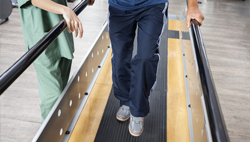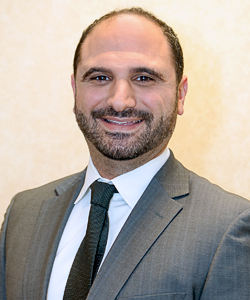A Guide to Total Knee Replacement - Available at MidAmerica’s Palos Hills & Mokena Locations

If you are plagued with chronic knee pain and impaired knee function to the point you can’t perform daily activities, such as walking or climbing the stairs, you may have considered total knee replacement. Furthermore if walking supports, medications, and physical therapy have not sufficiently managed pain and improved function, total knee replacement may be your next step. Although knee arthroplasty is referred to as knee replacement, it can be seen more as “knee resurfacing”, as only the surface of the bone is replaced. The first total knee replacement surgery was performed in 1968, and since then surgical techniques have vastly improved. Today, total knee replacement is considered one of the most successful procedures in medicine and is available at any of the MidAmerica locations, including Palos Hills & Mokena.
The primary causes of knee pain and immobility that may lead to knee replacement surgery include:
- Osteoarthritis - this type of “wear and tear” arthritis is the most common cause of knee pain and damage in adults. Osteoarthritis is a form of arthritis in which the cartilage between bones wears away over time, causing the bones to rub directly against each other, which leads to pain, stiffness and decreased mobility. It is most common in adults age 50 and older.
- Rheumatoid Arthritis - an autoimmune disease that causes inflammation between joint bones, wearing down the cartilage and resulting in pain and stiffness in the area.
- Post-traumatic Arthritis - this type of arthritis is caused by injury to the joint. Injury may cause damage to the cartilage between the joint bones leading to pain, stiffness, and lack of mobility.
Surgery
The goal of total knee replacement surgery is to provide the patient with a lasting, pain-free and mobile knee joint that allows them to return comfortably to daily activities. During minimally invasive knee surgery, as practiced by MidAmerica Orthopaedics, a short vertical incision is made across the knee to access the joint. After making the incision, the surrounding muscle is cut and detached to expose the joint. Next the damaged cartilage at the end of the tibia and femur are removed, in addition to a small amount of surface bone, preparing the bone for the implants. The surgeon will then position the implants, recreating the surface of the joint and resurface the kneecap (known as the patella) by inserting a plastic cap in place of the organic cap. Finally a plastic spacer is inserted between the implant components to allow for a smooth gliding surface. (Ortho Info)
The minimally invasive knee replacement technique aims to reduce post-operative pain and expedite recovery time. However, not everyone is a candidate for minimally invasive knee replacement, and your physician will help you decide which approach is best for you.
Risks
While total knee replacement surgery is a widely successful procedure, it is not without risks. Risks of total knee replacement include infection, blood clots, nerve damage, implant wear, and errors in positioning the implant.
Precision alignment is paramount. To ensure precision alignment, surgeons often perform total knee replacement surgery with the assistance of computers and robotic surgical components, which are less invasive and more accurate than traditional surgical techniques. (MidAmerica)
Post-Operative Physical Therapy

Physical therapy is integral to recovery following knee replacement surgery. Physical therapy helps maximize the functional outcome of your new joint. A physical therapist will help you regain knee mobility and practice movements such as walking up stairs. At MidAmerica Orthopaedics, our certified physical therapists will create a comprehensive, personalized post-operative physical therapy plan with the supervision of your orthopaedic surgeon.
Next Steps

Dr. Sarkis M. Bedikian
To learn more about MidAmerica Orthopaedics and the different treatment options available to you in Palos Hills and Mokena, visit our website.
To schedule an appointment with MidAmerica Orthopaedics surgeon, Dr. Sarkis M. Bedikian, call (708) 237-7200. You can also request an appointment online.

